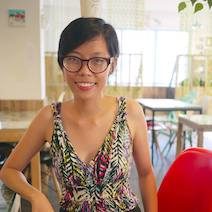SUMMARY
This is AI generated summarization, which may have errors. For context, always refer to the full article.
![[OPINION] What I learned from Anakpawis](https://www.rappler.com/tachyon/r3-assets/612F469A6EA84F6BAE882D2B94A4B421/img/EB0F19F3957E4045B18F2062D2D2FFAC/woman-anakpawis.jpg)

I am Rae, a member of Rural Women Advocates (RUWA), Amihan Women‘s pool of volunteers. We push for a genuine agrarian reform and fight against the exploitation and discrimination of peasant women. I have met former Anakpawis Representative Ariel Casilao several times. He always attends our activities, and is always willing to listen and share encouraging statements during our programs. I also know the relief volunteers of Sagip Kanayunan who were detained along with Former Rep Casilao. They are selfless young individuals who have been packing relief goods since the start of the enhanced community quarantine; they have been organizing fundraising drives for farmers and doing research work for and about the situation of our agricultural workers. (READ: Ex-Anakpawis congressman Casilao, relief volunteers post bail)
Leaders like Ariel Casilao and volunteers like Sagip Kanayunan activists helped me understand the world a little better. As an arts teacher, I have often felt helpless and detached from the real world. We train our students and critique their work according to learning standards set by arts educators. While the rest of the world suffers, the school calendar continues, and national competitions continue to be the basis for school and teacher achievements. There’s always a huge gap between our instructional materials and realities outside the classroom. I used to blindly follow the curriculum set by teachers and educators before me.
I became a better teacher because of Amihan and other peasant organizations where Ariel Casilao and the rest of the volunteers are part of. They do not teach “anti-government propaganda;” they organize seminars, workshops, and discussions about issues that not a lot of institutions dare think about. Who cares about the Rice Liberalization Law? The name alone is easy to dismiss. It sounds harmless because rice is something we take for granted. Because it’s something we consume every day, it’s so easy to not think about rice, especially its producers and the long process of rice production.
But Anakpawis and the rest of the peasant organizations campaign against similar policies because first and foremost, they know how this greatly affects farmers. They know that even before the Rice Liberalization Law, farmers have been buried in debt, have been suffering from the backward system of farming and from the hacienda system, and have been earning slave-like wages.
They do fact-finding missions, even risking their lives to extend help to militarized farming communities to research and gather data straight from the farmers, from the ground. This is how we learn about the situation of farmers during the lockdown. This is the reason why, despite the IATF’s food resiliency protocol that allows farming and fishing activities to continue, we learn that farmers are actually not allowed to harvest and maintain their crops. This is how we learn about specific communities in Cavite, Isabela, Cagayan, and Norzagaray where relief is scarce, even non-existent. Should we not publish works that reveal this reality? We need free mass testing and regular socio-economic relief to survive the pandemic and the lockdown. This is the reality. Not mere “anti-government propaganda.”
Because of organizations under Anakpawis, teachers like me get to learn from farmers. I am able to hear their stories, learn the process of farming, learn critical details about state policies and its effect, understand how I can help beyond just donating. Often, English teachers and Math teachers never get the chance to learn about the meticulous process of farming because it simply is not “relevant” to our classes. But I learn how our lives are connected, how my life depended on our rice producers, our agricultural workers because they offer their lives to provide the food that we eat at the school canteen, restaurants, and teacher conferences, and the baon we prepare for our kids. I learn about the history of our farmers, the history of oppression, understand the system that robs them of the chance to live decent lives. Finally, I learn about the peasant killings and join mobilization to seek justice for their brutal deaths. Is that not a fair and logical human reaction?
I am happy that Ariel Casilao and Sagip Kanayunan 6 have been released. I, however, together with my fellow Rural Women Advocates condemn the fascist response of Norzagaray police against the relief mission. The volunteers were wrongfully detained and unjustly accused of trump-up charges. They had to gather bail money which could have been used to procure more vegetables and goods from farmers in Benguet to produce more relief packs. Providing relief is not a crime. We shall all demand for socio-economic relief for our farmers and stop redtagging Sagip Kanayunan, Anakpawis, Pinoy Weekly and peasant advocates. – Rappler.com
Add a comment
How does this make you feel?
There are no comments yet. Add your comment to start the conversation.